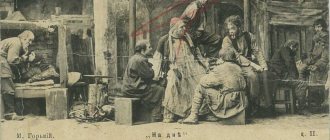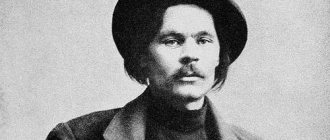- Essays
- On literature
- Bitter
- Dispute about a man in the play At the Bottom
Dispute about a person. Probably, this socio-philosophical problem can be called central in Maxim Gorky’s work “At the Depths”. It is the conflict based on this dispute that is the “engine” of the plot and it is around it that the position and opinion of the author himself is revealed. But before we begin to consider the plot, the conflict in the work and Gorky’s opinion regarding its solution, we should consider the setting in which the play takes place.
As characters who would have to “argue about a person,” Gorky chose poor people, broken by life, who, as a result of some life circumstances and difficulties, had sunk “to the bottom,” namely, to a seedy shelter for the poor.
It is in this wretched environment that one of the central characters of the play, an old tramp named Luka, finds himself among broken or at least life-tested people. Being a fairly wise and sincerely loving person, Luka sees in each inhabitant of the shelter not a poor person and a person who has sunk to the bottom, but an independent and independent person, broken either by a cruel life and difficult life circumstances, or by his own mistakes of the past, for which, the old man, however, is in no hurry to blame anyone. In each “lost” person he sees a person who, if he understands and accepts his mistakes and begins to act, then, in Luke’s opinion, he will have a chance to leave the seedy flophouse and return to an old, more worthy life.
He sincerely supports people and lends his shoulder to them, seeing only the best in each of them. He encourages the Actor to recover from alcoholism, and sees in the prostitute Nastya a girl dreaming of true and pure love. But he also comes into conflict with Satin, since the latter believes that only free people are capable of great deeds and correcting their mistakes, and Luka only makes the inhabitants of the shelter dependent on his compassion and pity.
And in truth, the subsequent plot proves that only those who were strong and free were able to correct their situation. Unfree and dependent on other people, on religion, on pity and compassion for them on the part of Luke, people were never able to improve, and some even drove themselves into an even worse situation. So, the same Actor, inspired by Luka, after his departure was faced with a cruel reality, where one must be strong and endure the blows of fate firmly and steadfastly. Unable to cope with the cruelty of the real world without anyone's support, the Actor leaves the world.
Thus, we can see that the position of Gorky himself is much closer to cruel, but also believing that “Man sounds proud!” Satin than to the soft, compassionate Luke.
Dispute about a person in the play by M. Gorky At the bottom
M. Gorky's play “At the Lower Depths” was created more than eighty years ago. And all these years it has not ceased to cause controversy. This can be explained by the many problems posed by the author, problems that at different stages of historical development acquire new relevance. This is also explained by the complexity and inconsistency of the author’s position. What influenced the fate of the work and its perception was that the writer’s complex, philosophically ambiguous ideas were artificially simplified, turned into slogans adopted by the official propaganda of recent years. Words: “Man. it sounds proud!” often became poster inscriptions, almost as common as “Glory to the CPSU!”, and children memorized Satin’s monologue itself, although they first corrected it, throwing out some of the hero’s remarks (“Let’s drink to the man, Baron!”).
Today I want to re-read the play “At the Lower Depths”, taking an unbiased look at its characters, carefully thinking about their words and looking closely at their actions. M. Gorky’s play is an innovative literary work. At its center are not only human destinies, but a clash of ideas, a dispute about man, about the meaning of life. The core of this dispute is the problem of truth and lies, the perception of life as it really is, with all its hopelessness and truth for the characters - people of the “bottom”, or life with illusions, in whatever diverse and bizarre forms they may appear. This dispute begins long before Luka appears in the shelter and continues after he leaves. Already at the very beginning of the play, Kvashnya consoles herself with the illusion that she is a free woman, and Nastya with dreams of a great feeling, borrowing it from the book “Fatal Love.” And from the very beginning, the fatal truth bursts into this world of illusions. It is no coincidence that Kvashnya throws out his remark, turning to Kleshch: “You can’t stand the truth!”
From the very beginning of the play, much sounds like an argument between M. Gorky and himself, with his previous idealization of tramps. In the Kostylevo shelter, freedom turns out to be illusory - having sunk to the “bottom”, people have not left life, it overtakes them. And Gorky’s former desire - to see first of all the good in tramps, lumpen people, people rejected from normal human life - also recedes into the background. These people are cruel to each other, life has made them that way. And this cruelty is manifested primarily in the persistence with which they destroy the illusions of other people, for example, Nastya, the dying Anna, Kleshch with his hope of getting out of the shelter, starting a new life, the Baron, whose entire wealth consists of memories of the past greatness of the family and to whom Nastya throws out the remark in fury: “You’re lying, this didn’t happen!” Among these people, embittered by life, the wanderer Luke appears. And with his appearance, the already begun dispute about man, about truth and lies in his life, intensifies.
See also: Order 150n Russian Railways
Let's take a closer look at the image of Luke. First of all, we note that it is this character of the play that causes the most heated debate and constitutes its dramaturgical nerve. Luke consoles people. How can we console these former barons, actors, a working man who has lost his job, a dying woman who has nothing good to remember about her life, a hereditary thief, thrown out of life, who have sunk to the bottom of its life? And Luke resorts to lies as a verbal drug, as a painkiller. He instills illusions in the inhabitants of the shelter, and his life experience is such that he subtly feels people, knows what is most important to each of them. And he unmistakably presses the main lever of the human personality, promising Anna peace and rest in the next world, free hospitals for alcoholics for the Actor, and a free-willing life for Vaska in Siberia. Why is Luka lying? Readers and critics have asked themselves this question more than once when reflecting on Gorky’s play. For a long time, negative assessments prevailed in interpretations of the image of Luke; he was accused of indifference to people, of self-interest (his very name is consonantly associated with the word “evil”, and one of the meanings of this word is close to the unclean, to the tempter). Luka was also accused of tempting people with his lies, and the main accusation was the death of the Actor; in the image of Gorky’s wanderer, they looked primarily for ideological origins; he was associated with sectarian runners, with the ideas of Tolstoyism.
However, if you look closely at what Luke does, listen to his speech, you understand that the mechanism of his consolation is simpler and more complex. He simply did not harden his soul; one cannot but agree with the assessments that Satin gives to Luke: “He lied... But this is only out of pity for you.” Luka doesn’t just deceive, throughout the play he does real, active good: he consoles Anna before her death, tries to reassure Vasilisa. It is this wanderer who prevents Vaska from killing Ash Kostylev (by the way, Satin directly pushes Vaska to kill: “... and why don’t you kill him, Vasily?!” - and further: “Then marry Vasilisa. You will be our master.” “. And to Siberia he advises Ash to leave as soon as possible, because he foresees that this matter will not end well, and his foresight turns out to be correct. Luka is not just lying to the actor, he persuades him: “Just this: get ready for now! Refrain. Pull yourself together and be patient "And the reason for the death of the Actor is not in illusions, but in their collapse, in insight, in the consciousness of the impossibility of abstaining and pulling oneself together. Luke is not just a comforter, he philosophically substantiates his position. One of the ideological centers of the play is the wanderer’s story about how he saved two escaped convicts. The main idea of Gorky's character here is that it is not violence, not prison, but only good that can save a person and teach goodness: “A person can teach goodness.” While a person believed, he lived, but he lost faith and hanged himself . So, in the play, as you can see, the main bearer of good is Luke, he takes pity on people, sympathizes with them and tries to help in word and deed. The author's position in M. Gorky's drama is expressed, in particular, in terms of plot.
The last event of the play - the death of the Actor - confirms Luke's words: the man believed, then lost faith and hanged himself. It is generally accepted that Luke’s main opponent in the dispute about truth is Satin. This seems to be the case, because it is he who pronounces the aphorism: “Lies are the religion of slaves and masters. Truth is the god of a free man!” However, it is Satin who not only stands up for the old man, forbidding him to speak ill of him, but also pronounces his famous monologue about the man, bringing Luke’s ideas to life. Indeed, what is reasoning if not a verbal drug designed to console everyone around, to instill in everyone the illusion of their own worth, regardless of real human affairs. It is not without reason that it is after Satin’s monologue that a drunken revelry begins in the rooming house, and even the herald of the merciless and evil truth Bubnov declares: “How much does a person need? Here I am - I drank and I’m glad!” And only the news of the Actor’s suicide suddenly interrupts this picture. That’s why the last words of the play, put into Satin’s mouth, sound so meaningful: “Eh. ruined the song. stupid cancer!” It is not Satin who really argues with Luka, but the author of the play himself.
It is Gorky who shows that a saving lie did not save anyone, that it is impossible to live forever in captivity of illusions, and the way out of them and insight is always tragic, and most importantly, that a person living in a world of comforting dreams, lulling deception, comes to terms with his wretched, hopeless reality life. This leads him to what he agrees to endure - this motive is heard more than once in the play, for example, in the words of Anna: “If there is no flour there. You can be patient here. it’s possible!”, or in the parable of the righteous land - a man lived poorly, but endured in the hope of finding a different life someday. M. Gorky does not accept this reconciliation with life. The writer’s dispute with Luke is in many ways a dispute with himself. It was not for nothing that contemporaries recalled that in his human qualities M. Gorky was in many ways close to this wanderer-comforter.
It was not for nothing that already in the post-revolutionary period he wrote the film script “On the Way to the Bottom”, where, under the influence of ideological dogmas, he exposed Luka and showed him as a kulak, a criminal and immoral person. But this script turned out to be a creative failure for M. Gorky, and the play “At the Lower Depths” continues to live today, causing numerous disputes and acquiring new relevance. The image of Luke for a long time was assessed in literary criticism as unequivocally negative. Luka was accused of lying for selfish reasons, that he was indifferent to the people he deceived, and finally, that at the time of the crime he disappeared from the shelter. But the main accusation that was brought against Luke concerned his position, his attitude towards man. He preaches pity and mercy, which in previous years were considered something superfluous, even suspicious, a kind of manifestation of conciliation, a retreat from the position of fighting the class enemy (and they saw an infinite number of enemies around them), mercy was declared “intellectual softness”, which is unacceptable in conditions of a clash between two worlds. Another thing that was not accepted in Luke’s position was that he did not call people to struggle, to revolutionary action, to a radical change in life. All this in ancient years was considered harmful and alien to the person of the new society, the “fighter for a bright society.” Today, the image of Luke is read in many ways differently, and the reason for this can simply be a careful, unbiased acquaintance with Gorky’s play.
Other publications:
- Allowance for 3 children under 3 years of age in Novosibirsk Child benefits in Novosibirsk and the region If your child was born in 2021, then you are entitled to a benefit of the exact amount that was established for the period from January 1, 2021 to January 1, 2021. The amount changes annually taking into account inflation; And […]
- Submit an application to the Moscow registry office Marriage registration in Moscow: step-by-step instructions The first step towards legal married life is choosing the district registry office in which you are going to legalize your relationship. You can register at any branch or [...]
- Occupational safety return of money from the FSS Documents for financial support of preventive measures on occupational safety Address: 683000, Russian Federation, Petropavlovsk-Kamchatsky, st. Leninskaya, 56 Reception (fax) Mon-Fri: 9:00 – 17:45 (break from 12:45 to 13:30) !For women […]
- How to register the purchase and sale of a private house with a plot of land Registration of the purchase and sale of a house with a plot of land The sale of a house and the plot of land on which it is located must be carried out in compliance with the rules and requirements of the law. The main thing that should never be forgotten by those wishing to sell or buy [...]
- A blonde and a lawyer are on a long flight. A blonde and a lawyer are on a long flight. There is a blonde and a lawyer in the next seats on the plane. It's a long flight. The blonde silently turns away and looks out the window. Lawyer: Girl, let’s play a game: I’ll ask you a question and if you don’t know [...]
- What benefits are available for the 3rd child in 2021? Benefit for the third child from 2021 (list of regions) Who is eligible? The average family income is below the regional subsistence level for each family member. Where to contact? IN RUSZN (SOBES). How long does it take to pay? Benefit payments are made [...]
Essays on the topic of a dispute about a person in Gorky’s drama at the bottom






